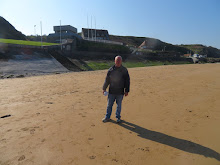In 2021 I read 18 books, and earlier this month I posted the first six of the dozen that had the most impact on me. Here are books 7-12 on my list of favorites.
7. Cat on a Hot Tin Roof by Tennessee Williams #1954. This play won the Pulitzer Prize for Drama in 1955. Big Daddy and the machinations swirling around his fortune and his alcoholic sexually ambivalent favored son, Brick and his dissolute wife Maggie. She speaks wisdom that is applicable to our polarized country one year out from January 6: "Silence about a thing just magnifies it. It grows and festers in silence, becomes malignant . . ."
8. The First Wave: D-Day Warriors Who Led the Way to Victory in WW2 by Alex Kershaw #2019. Extraordinary heroism at work on the five invasion beaches and beyond by men who were the tip of the spear that pierced the Third Reich and destroyed fascism in the world, at least until it reared its ugly head here on home ground during the last enabling, potentially fatal presidency. When I visited the five beaches with the aid of a paid guide in 2019 with friends, it cracked us up when the guide referred the three beaches (Sword, Juno and Gold) stormed by the Britsh and Canadians as "the Commonwealth beaches." When I stood on Omaha Beach, the bloodiest beach to secure and a very near thing, I was standing on a place of now-lost American exceptionalism.
9. Das Reich by Max Hastings #2013. The bloody tale of the blood-soaked trail left across France by this elite SS Panzer Division as it made its way from garrison duty watching the coast in Southern France to the raging battle in Normandy after D-Day. Traveling mostly at night to avoid Allied air interdiction in the daylight, it took 10 days to arrive at the battlefield because the division stopped to exact terrible retribution upon innocent civilians almost every time it was attacked in any fashion by the French Resistance enroute--expending murderous German fury over the lost war on the hapless and helpless French population.
10. 1776 by David McCullough #2005. The book dragged on a bit as it covered a bewildering cast of colonial characters while it described the important events of the fashioning of our nation like Lexington and Concord, the Battle of Bunker Hill and finally Washington forcing the British to withdraw from Boston by maneuver rather than battle.
11. Six Frigates: The Epic History of the Founding of the US Navy by Ian W. Toll #2006. An interesting account of the early growth of the US Navy from gunboats guarding the rivers and coastline of the nasceant United State building warships able to challenge British warships in proper one-on-one situations and to project American power overseas, especially against the Barbary Pirates.
12. "A Few Acres Snow" The Saga of the French and Indian War by Robert Leckie #1996. A French minister consoled the French king who was lamenting losing Quebec and the upper Mississippi Valley to the British during this war by describing the loss as merely a few worthless acres in a winter wasteland while France still controlled rich sugar-cane islands in the Caribbean. How did that work out for the French?
The other six books were hardly worth mentioning but I did glean a few factoids and interesting tidbits from each of them, I suppose.

No comments:
Post a Comment